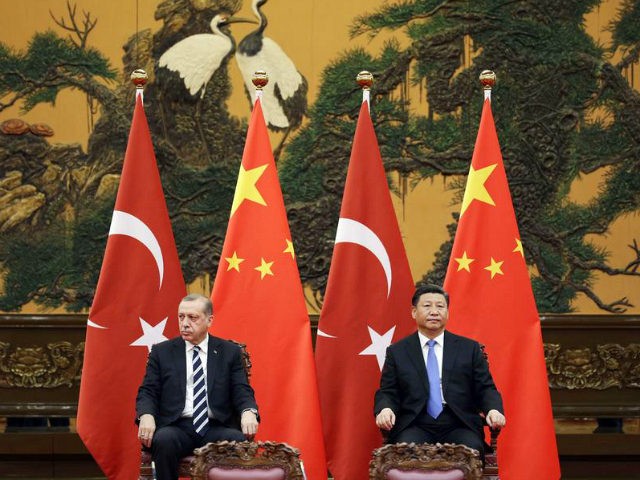Beijing claimed on Monday its Belt and Road Initiative (BRI) will support member nations struggling to restart their economies post-coronavirus pandemic and that, by doing so, it will help “rekindle hope” for the global economy.
The Chinese Communist Party (CCP) uses its BRI to build infrastructure in developing nations, further expanding its influence across the globe. Nations that sign on to the scheme fall into debt traps crafted by the CCP, as BRI loans are believed to often require member nations to exclusively use Chinese contractors and materials to build the projects (BRI contracts are often kept secret). In a practice known as circular lending, Beijing demands massive amounts of collateral for the loans.
In mid-April, the Center for Global Development warned that “15 out of 68 BRI partner countries face a significant risk of debt distress” due to economic challenges caused by the coronavirus pandemic. The warning was in stark contrast to a report by China’s state-run Xinhua News Agency on Monday, which claimed that Beijing’s predatory loan initiative would help boost member nations’ economies post-pandemic.
“As the COVID-19 [Chinese coronavirus] pandemic is dragging the global economy into a deep recession, the Belt and Road Initiative, with the participation of overseas Chinese enterprises, have [sic] rekindled some hope,” Xinhua wrote.
Beijing’s BRI has served as “an international platform for cooperation” and “played a vital role in assisting the fight against the pandemic and stabilizing global supply and industrial chains,” the state media outlet claimed.
“In the first half of 2020, China-Europe freight trips rose 36 percent year-on-year to 5,122, transporting 3.67 million pieces and 27,000 tons of anti-pandemic materials to European countries, including Italy, Germany, France, Spain, Poland, and Hungary,” Xinhua boasted.
With many European countries easing coronavirus lockdowns in recent weeks, China said it has resumed work on BRI projects paused by the pandemic in some member nations, including Croatia.
“Since being discharged on August 22 from a 14-day quarantine after their arrival, over 140 Chinese workers have been devoted to the construction of Peljesac Bridge, the biggest infrastructure project in Croatia,” Xinhua reported.
“We can’t emphasize more on the significance of the bridge to the Croatian people and also to us [Chinese],” Lu Shengwei, a representative of the Chinese construction team on the project told the news agency. “Everyone knows that the EU [European Union]-funded bridge that links Croatian territories has been entrusted with a Chinese company.”
In neighboring Serbia, Pavle Basic, a member of the Serbia National Council for Coordination of Cooperation with Russia and China, told Xinhua that his country “has given its full support to the Belt and Road,” which he claimed was a driving force of the global economy.
“We deem the initiative as one of the most significant initiatives on the global arena, which will contribute to the creation of worldwide partnerships in all areas,” Basic said.
On August 5, Balkan media reported that thousands of biometric surveillance cameras made by Chinese-owned telecom giant Huawei were “en route” to Serbia. The surveillance equipment is part of Serbia and China’s joint agreement to install Huawei’s signature “safe city” surveillance system in Serbia’s capital, Belgrade. As part of the ongoing project, Belgrade has agreed to install 2,000 “high-definition cameras, which use facial and license plate recognition software, in 800 locations across the Serbian capital over the next two years,” Foreign Policy reported in June 2019. Serbia’s interior ministry has touted the project as a crime-fighting initiative meant to increase people’s safety.
“Serbia purchased the cameras as well as an artificial intelligence system used to analyze the feed that they capture,” Albania’s Exit News noted. “The cameras … capture an image of facial features before analyzing them to identify the individual against [an] existing database.”
The E.U. warned Serbia last fall that installing a Chinese-owned surveillance system poses a major national security threat that may make the Union uncomfortable with including Serbia in the future.
“Serbia’s plans have already raised eyebrows in European Parliament. In October 2019, [Members of European Parliament] MEPs Mara Bizotto and Anna Bonfrisco noted that under the Chinese National Security Act, all data in the possession of Huawei belongs to the [Chinese] Communist Party intelligence services,” the Balkan news outlet noted.

COMMENTS
Please let us know if you're having issues with commenting.